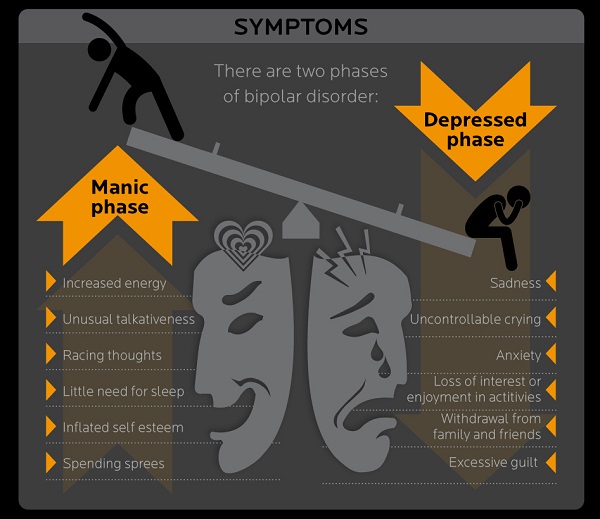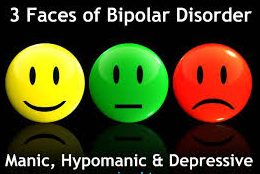The ability to feel a wide range of moods and emotions like joy and sadness is a natural part of human life. Moods and emotions helps us to make sense of the world. For people suffering from a bipolar disorder, their mood states are more extreme, last for long periods and make it hard to function in everyday life. Bipolar disorder is a major mood disorder in which people have two distinct types of episodes of opposite extremes of mania and depression.
A manic episode is a period of euphoric or ‘high’ mood lasting at least a week. During this state, individuals have increased energy and activity levels and appear talkative and overconfident. They may need less sleep and behave recklessly, such as overspending or driving dangerously. Hypomania is the term for a less severe form of mania.

To be considered a manic episode, the mood change must last at least one week and be severe enough to cause problems at work, school or in social activities or relationships. A hypomanic episode is less severe, shorter in duration and does not include psychotic symptoms.
An episode of depression is a period of sad or low mood lasting at least two weeks. People with depression have low energy and find it hard to concentrate or work effectively. They have negative thoughts, lose interest in normal activities and become withdrawn. Some people may become suicidal during an episode of depression.
 The pattern of mood swings is different for each person. Some may have an episode of mania once every few years, while others may have several episodes a year. Occasionally, the symptoms of both mania and depression can occur at the same time (mixed features). A person may also develop rapid-cycling bipolar disorder, characterised by four or more episodes of major depression, mania, hypomania or mixed symptoms within a year.
The pattern of mood swings is different for each person. Some may have an episode of mania once every few years, while others may have several episodes a year. Occasionally, the symptoms of both mania and depression can occur at the same time (mixed features). A person may also develop rapid-cycling bipolar disorder, characterised by four or more episodes of major depression, mania, hypomania or mixed symptoms within a year.
Some people with bipolar disorder can become suicidal. The suicide rate is about 20 times higher than in the general population. If you think a person is in immediate danger from suicide, call Triple zero (000) (or 112 from a mobile phone) immediately or go to the nearest emergency department.
If you have any questions or would like to make an appointment, please contact us on 8448 1106.
